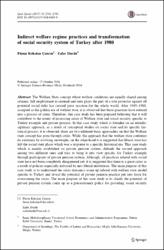| dc.contributor.author | Çımrın, Füsun Kökalan | |
| dc.contributor.author | Durdu, Zafer | |
| dc.date.accessioned | 2020-11-20T14:51:41Z | |
| dc.date.available | 2020-11-20T14:51:41Z | |
| dc.date.issued | 2017 | |
| dc.identifier.issn | 0033-5177 | |
| dc.identifier.issn | 1573-7845 | |
| dc.identifier.uri | https://doi.org/10.1007/s11135-016-0445-8 | |
| dc.identifier.uri | https://hdl.handle.net/20.500.12809/1791 | |
| dc.description | WOS: 000412810400021 | en_US |
| dc.description.abstract | The Welfare State concept where welfare conditions are equally shared among citizens, full employment is ensured and state plays the part of a sole protector against all potential social risks has created great reaction for the whole world. After 1945-1980, accepted as the golden era of welfare state, it is observed that these practices have entered into a process of crisis. Therefore, this case study has been prepared believing that it will contribute to the issues of increasing crisis of Welfare state and social security specific to Turkey example and private pension. In this case study which is founded on an interdisciplinary approach, as a result of conceptual studies on social state and its specific historical process, it is observed, there are two different basic approaches on that the Welfare state concept has gone through crisis. While, the approach that the welfare state continues its existence by evolving outweighs, on the other hand it is suggested that liberal state has left the social state phase which was a response to a specific historical era. This case study which is mainly established on private pension system, defends the second approach among two different ones and tries to bring it into view specific for Turkey example through participants of private pension system. Although, all practices related with social state have not been completely disappeared yet, it is suggested that there is a great crisis as a result of policies especially enforced by neo-liberal institutions. The main purpose of this case study is to understand the crisis dynamics come up related with welfare state model specific to Turkey and reveal the potential of private pension practice put into force for overcoming the crisis. The main purpose of this case study is to clarify the potential of private pension system come up as a precautionary policy for providing social security concept at senility era which is accepted as a social risk in respect of fair distribution of welfare conditions for whole society and overcoming social security needs of citizens within the context of social structural dynamics specific to Turkey. | en_US |
| dc.item-language.iso | eng | en_US |
| dc.publisher | Springer | en_US |
| dc.item-rights | info:eu-repo/semantics/openAccess | en_US |
| dc.subject | Crisis of Welfare State | en_US |
| dc.subject | Social Security System | en_US |
| dc.subject | Turkey | en_US |
| dc.subject | Private Pension System | en_US |
| dc.subject | Case Study | en_US |
| dc.title | Indirect welfare regime practices and transformation of social security system of Turkey after 1980 | en_US |
| dc.item-type | article | en_US |
| dc.contributor.department | MÜ, Edebiyat Fakültesi, Sosyoloji Bölümü | en_US |
| dc.contributor.institutionauthor | Durdu, Zafer | |
| dc.identifier.doi | 10.1007/s11135-016-0445-8 | |
| dc.identifier.volume | 51 | en_US |
| dc.identifier.issue | 6 | en_US |
| dc.identifier.startpage | 2781 | en_US |
| dc.identifier.endpage | 2792 | en_US |
| dc.relation.journal | Quality & Quantity | en_US |
| dc.relation.publicationcategory | Makale - Uluslararası Hakemli Dergi - Kurum Öğretim Elemanı | en_US |


















